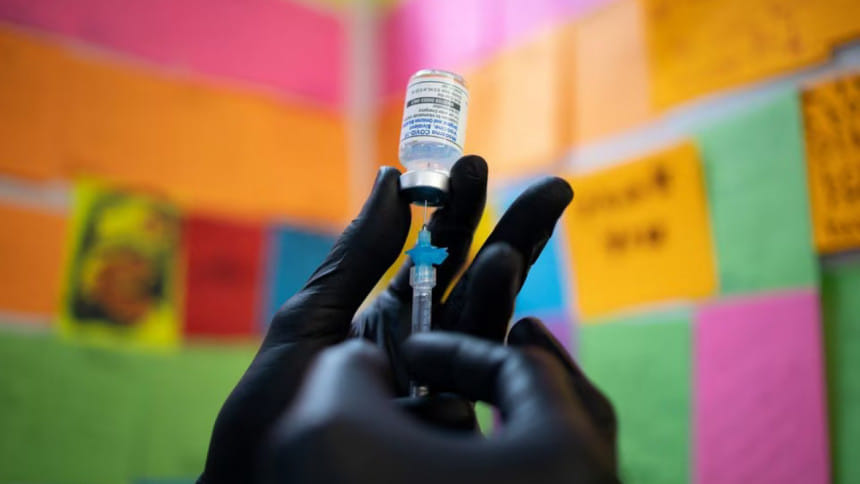What does the new Covid spike mean for Bangladesh?

A report published by the World Health Organization (WHO) on August 10 showed that Covid-19 cases had increased by 80 percent over 28 days, from July 10 to August 6, compared to the previous 28 days. The same analysis found that South Korea reported 1.2 million new infections during the same period. In fact, the country's surge of the subvariant of Omicron – EG.5 – alone has driven up the global infection rate. The US Centers for Disease Control and Prevention (CDC) has also reported a 14 percent increase in Covid-19 hospitalisations in the first week of August. However, the actual global infection rate is much higher, as infections are no longer continuously tracked and testing has sharply declined universally. Indeed, this spike bodes for a worldwide surge of Covid-related illnesses in autumn.
But what does this new spike in Covid infections mean for Bangladesh?
As of now, the country has lost 29,476 lives to the pandemic, and experienced more than two million infections. Of course, after the highest number of deaths in June and August of 2021, daily deaths and infections have steadily declined. Despite that, there have been reports of deaths due to Covid throughout 2022 and 2023. On June 28 this year, five died from the virus, and in the current month of August, four deaths have so far been recorded.
Experts contend that Covid has effectively become a seasonal flu and is not strong enough to create a wave anywhere in the world as of now. They have, in fact, lowered the threat of the virus globally, as they anticipate it to be more of a public health challenge, not a crisis. In the US, the Joe Biden administration has even eliminated the position of the top Covid-19 White House official along with its formal ending of the Covid public health emergency in May this year. The administration does not expect the virus to become a major development in any way that can disrupt public life.
However, of particular note is the view of the Association of Public Health Laboratories CEO Scott Becker, "We never expected variants to just disappear. So, the virus is doing what viruses do. We're watching all of this in order to better be prepared for any fall surge in respiratory diseases."
What is our part that we must do?
The first approach is to maintain and observe best practices to not get the virus in the first place: for example, wearing a mask, maintaining social distance practices, and of course, getting the recommended vaccines and boosters to avoid hospitalisation. Most healthy adults develop some degree of immunity from vaccination, prior to Covid infections, and the overall availability of treatment plans. However, they can well spread the virus to their loved ones and even end up in emergency departments if they are not vaccinated and boosted.
A new study published by Yale University researchers found a preliminary connection between practising the recommended Covid guidelines and Covid-related deaths. The researchers studied 538,159 registered Democrats and Republicans in Florida and Ohio who died between January 1, 2018 and December 31, 2021. They marked May 1, 2021, one month after Covid vaccines were available to all US adults, as a major milestone. The study aimed to scientifically analyse data to discover if the apathy to observe Covid guidelines has a bearing on the deaths. It found that 43 percent more Republican voters died from Covid than their Democrat counterparts.
Republicans are overwhelmingly conservative and have expressly objected to most Covid regulations, and even vaccine mandates, deeming them to be an obstacle to their freedom of choice and civil liberty. So, from the party leadership, including former President Donald Trump, to the common supporters, there was strong opposition to most restrictions. By contrast, Democrats overall strongly adhered to the guidelines. Once in the White House, Biden also placed strong Covid measures to curb the pandemic.
In Bangladesh as well as globally, many evoke God's will to skirt recommended practices around health issues. The study above should be a wake-up call to those who readily bank on unproven and unscientific approaches to their health.
Alongside adhering to established Covid practices, we must also replenish our stockpiles of vaccines. We must coordinate with vaccine manufacturers, foreign governments and international agencies to ensure enough availability of shots, as they have proven to be the most effective in fighting the disease, per the Yale study. We must prioritise two high-risk groups in vaccination programmes: the elderly and those with low income. The hospitalisation rate for seniors is significantly higher than that for other age groups. We must ensure that all at-risk populations have their testing and vaccine needs met immediately and adequately.
The new Covid spike should be taken as a clarion call to prepare as we head into the autumn when the cases are expected to surge. Bangladesh may experience a localised spike or a small wave at worst. Even though the virus will pose considerably less danger to public health than it did during the height of the pandemic, it will continue to remain a challenge and claim lives while driving up hospitalisation and even potentially straining our healthcare system. Early preparedness and prevention programmes can make all the difference when the virus will trend up in the winter. It is the time to act now.
ABM Uddin is a healthcare and IT consultant at the Florida Agency for Health Care Administration. Views expressed in this article are the author's own.

 For all latest news, follow The Daily Star's Google News channel.
For all latest news, follow The Daily Star's Google News channel. 








Comments